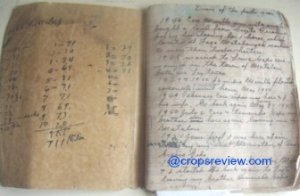This is a call and invitation intended for those crop farmers, farm managers, home gardeners, farmworkers, teachers, students, extension workers, technicians, plant lovers, and everyone else who may have first hand knowledge or actual experience in the application of unique agricultural technologies and practical methods in farming and gardening.
Come on, let us join hands in building an e-museum that will store and exhibit these stories.
To participate, post your story via the Comments box provided below. Please abide by our commenting rules (click here to read) and use English only.
Follow also the principles of 5Ws and 1H (who, what, where, when, why, and how) in your writing.
Please understand also that this site has readers from all around the world.
Therefore, for further identification of what is referred to in your story, you are likewise enjoined to exercise earnest effort to be able to provide English common names of plants (or any organism) and, if possible, also scientific names.
But no, these are not absolute requirements. Some readers, in fact, may be able to shed light.
All postings will be visible to the public.
However, you may opt to send your story in confidence or with instructions to this site’s founder-webmaster through our Contact Us form.
You are likewise invited to write as a visiting author a full-blown article about your story in 500 words or so.
The web page can include duly compressed photographic images. In this case please contact us using this same form to signify your intention (click here).
Why This e-Museum and What Crop Farmers’ Stories are Relevant
Please be relevant and do not post mere hearsays. Verify your facts first, and no no no, no plagiarism.
It is in keeping with one of the aims of this site that this proposed e-Museum is put into effect. As stated in About CropsReview.Com:
Farmers themselves conduct researches, usually by trial and error over a long period of time.
If only made known, these can become valuable basis for formal research or simulated application. It’s a waste if all these are lost.
The owner-founder himself has had access to some valuable information but, failing to document the same, they have long been reduced to nothing.
The memory just cannot be accorded total reliance; it degenerates with the passage of time.
Similarly, even printed sources in one’s possession do not live forever.

Indeed, my late grandmother, Luisa Pada-Gopo Murillo, was an extraordinary crop farmer. I can’t avoid thinking that although she was only a 7th grader, I pale to her in comparison.
Her efficiency, memory, resourcefulness, and foresight astound me. She’s actually my grandaunt.
But her sibling, my maternal grandfather, passed away when my mother was still a child and she was everything a grandmother should be to us.
She used to grow leafy vegetables such as cabbage and mustard in pots in Leyte, Philippines.
I also remember that dwarf atis or sugar apple (Annona squamosa) in a pot that was placed on top of the concrete fence in front of the homelot.
She took care of the tree for medicinal purposes and whenever I visited her I did the watering.
She never took synthetic medicines or went to the doctor. She had her stock of dried stems and roots in a pouch.
They were unmarked, but she was capable of identifying each species.
She would select the ingredients and prepare medicinal drink whenever she was ill or I was in those few times that I visited her.
For shampoo and health care she would collect fresh leaves and twigs from around the homelot and from neighbors.
I could identify with certainty only the leaves of pummelo.
I’m not certain, but there’s another which was probably a hilbas or damong maria (Artemisia vulgaris).
She would immerse these in a tub of water before taking a bath.
I remember well that when she emerged from the bathroom her long hairs were glossy and she smelled nice.
I can describe that smell now only as “nature fresh” and definitely not any of the smells from commercial perfumes.
What a waste. I realized much too late that I had plenty of opportunities to document her medicinal and bath plants, but I did not.
Very recently I discovered her “Memoirs of the past yrs / Diary of the past years”.
There’s this entry on the first page that they started planting coconut on her (and husband’s) farm in Sarangani Province in 1949.
Now, according to my 76-year-old mother, the varieties of coconut on the farm are those of the Bilaka and Dahili.
Therefore it appears that reckoned from 1949 to the present, dwarf varieties of coconut can remain productive for at least 60 years!
Stories of Unique Crop Farming Techniques in This Site
It is not easy to ascertain whether or not an agricultural technology, technique, or practice is indeed unique or new unless a comprehensive historical review is undertaken.
It also depends on any individual’s point of view. It can be so for any layman, but not to others.
Fully aware of these, here are some stories published on this site about these technologies, techniques, or practices relevant to crop farming that are potentially unique, practical, or new (click to read):
Bare-root transplanting of mature mango and of soursop
Intervarietal conversion in mature mango
Propagation of sampagita by leaf cuttings
Backyard in vivo propagation of giant staghorn fern by spore
Simultaneous vermicomposting and edible mushroom production
Food production by vertical gardening
Crop-livestock integrated farming
Using coffee bareroot wildlings in farm establishment
Inducing simultaneous maturity of mango leaves by defoliation
How to locate contour lines in sloping lands using level hose
Now, fellow crop farmers, home gardeners et al., tell us you stories too! (Note: et al. is for et aliis).
